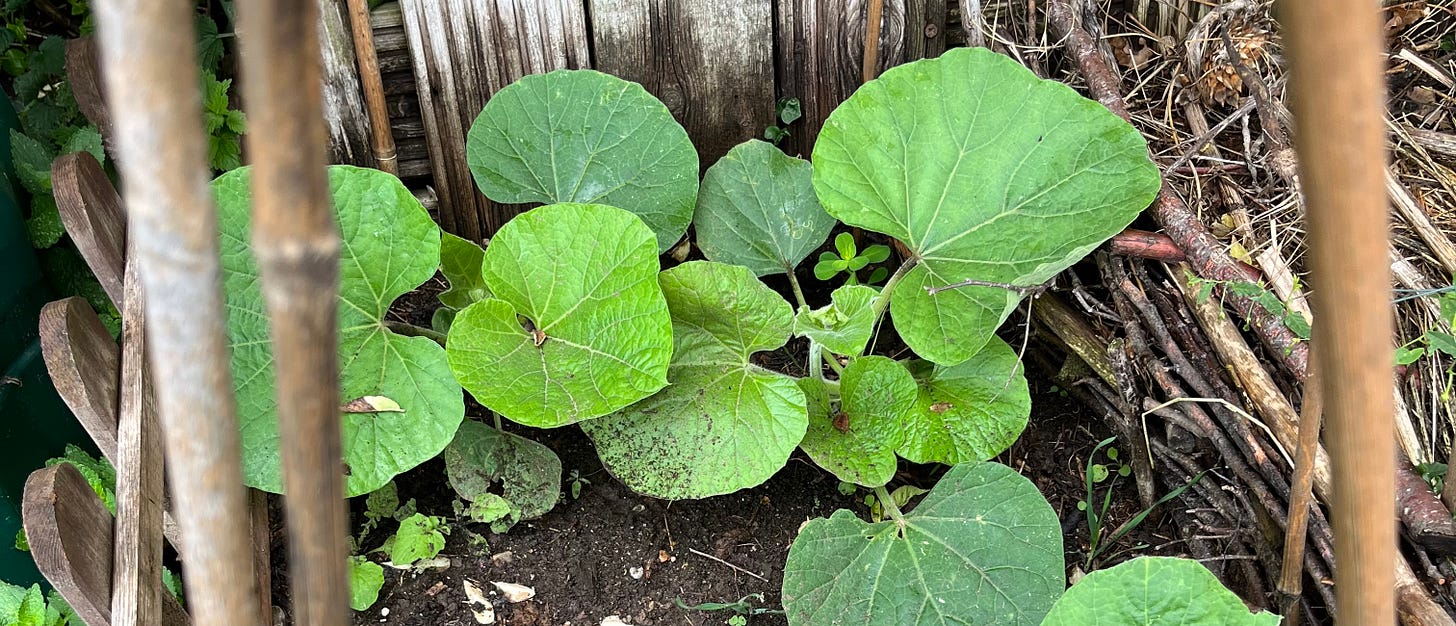22.7.25
in the soil
It has been tipping down all weekend and it is supposed to rain more today and so I come with no real plans in mind, the main thing to do at this time of the year is to strim the grass which is too wet to strim and to weed a little but I don't like to pull weeds out of the wet soil and in most places the weeds are kept down by the plants I want to be there, in the combined shade of the cucumbers and green beans for example there is no space for weeds. I am sure now that the courgettes are not being pollinated, just one plant by itself away from others and in fact there is only one female flower open; a male flower falls off and I poke it around to try and get whatever pollen is in there (not much after the rain, I would have thought) where it wants to be. I'll just eat a lot of courgette greens if the fruit never grow, I think to myself, and at least the cucumbers are growing now, plenty of flowers coming and one little cornichon-sized fruit not quite ripe on the vine, in the shade. Kohlrabi and turnip seeds have germinated well and the seedlings somehow survived slug and pigeon (pigeons love brassicas of all kinds), both now are netted and pelleted against attack; under the hedge the cucuzze are growing wide but not yet high enough to support their dangling fruit, and above them the first elderberries wine-ripe – it feels wrong, the elderberries ready before the cucumbers, each year the seasons not quite the same.
in the kitchen
I eat the first three blackberries of the year, my larger "cultivated" ones rather than from the hedges, the first is very sweet and the second is very sour and the third is very bland, or maybe I just can't taste anything because my mouth is still full of the second's sourness; it makes me think how rare it is to find such variation, how reliable everything has become. Even supermarket tomatoes are good now if you don't buy the very cheapest! It is difficult to teach people how to look at fruit and to taste it, that a blackening persimmon fit to burst is exactly at its peak. At work we are buying boxfuls of peaches, a different variety each time, and some have needed cooking and some just macerating, some peeling and others just blitzing into a wine syrup to make sorbet, some plump and yellow, others flat and themselves mottled purple as if wine-stained.
on the page
I read quite a lot of literature in translation and I also read most things Jen Calleja writes (although not many things that she has translated, I realise now) and so I was keen to read Fair: The Life-Art of Translation which was a) brilliant and b) not really summarizable so I will not attempt to do so, go and read it! I was interested to read close to the end a quotation from John Berger saying that the work of the translator is to find what lay behind the words of the original text before it was written partly because, well, it is interesting, and partly because I was thinking a while ago how Berger wrote Ways of Seeing and a Booker-winning novel and essays and poetry and made himself un-pigeonholeable in a way which hardly seems possible these days but how similarly Jen Calleja refuses to settle herself in any one of her disciplines.




